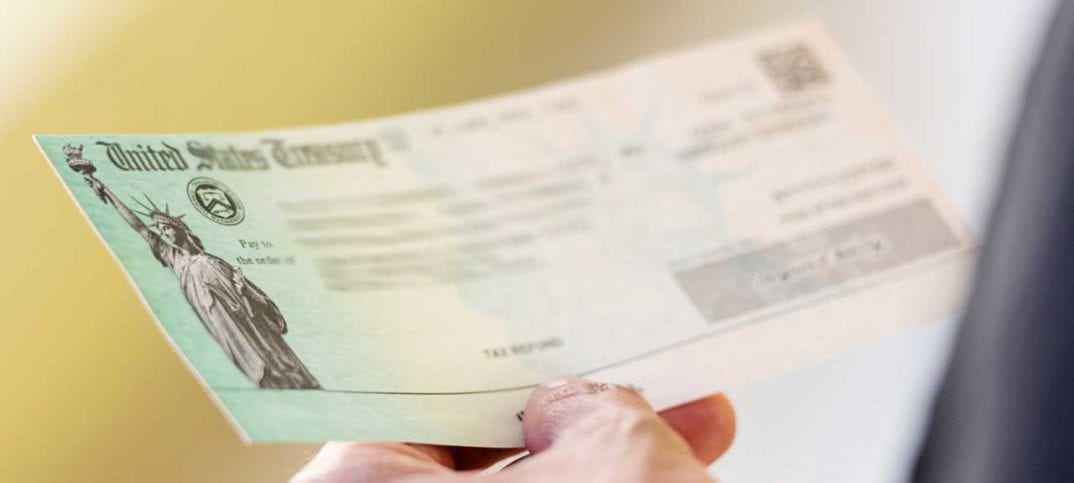By Linda Toga, Esq.

THE FACTS: My father died in September, 2018. This April I received a check from the United States Treasury payable to my father in the amount of $1,200. The check reflects the Economic Impact Payment or stimulus check authorized for many citizens as part of the Coronavirus Aid Relief and Economic Security or CARES Act. My family could really use the money since I lost my job when the business I worked for closed in March but, I’m not sure if I should I cash the check.
THE QUESTION: Are deceased individuals or their families entitled to Economic Impact Payments?
THE ANSWER: There has been a great deal of confusion concerning stimulus checks that were sent to deceased individuals. I have received quite a few calls from clients asking whether they can cash checks sent to individuals who died recently, as well as individuals that died well before your father.
Adding to the confusion is the fact that some of the checks in question include the notation “DECD”, short for deceased, on the payee line. This certainly suggests that the Treasury knowingly sent checks to deceased individuals and has lead a number of people to conclude that the checks can be cashed. Other callers have suggested that since their loved one either died from the coronavirus or suffered financially from the virus before passing that their estate should be entitled to the stimulus funds. Unfortunately for the families of the deceased check recipients, the government does not see it that way.
On May 6, more than a month after checks were first mailed out, the IRS tried to clarify the situation by stating on its website that funds that were sent to deceased individuals should be returned. They provided instructions for how that should be done.
However, rather than bringing clarity to the issue, the posting on the website added to the confusion. That’s because the posting states that if the payee died “before receipt of the payment,” the payment should be returned. If all payments were made by checks that were mailed to the recipients and delivery times throughout the country were the same, the IRS post may settle the question.
However, since the time it takes for mail to be delivered to different places varies, and since some people received checks through the mail while others had the funds deposited directly into their bank accounts, a rule that relies on receipt of the payment rather than the date the payment was authorized inevitably favors those people with slow mail service.
For example, if Mr. Smith’s check is mailed on April 11 and received on April 14 and Mr. Cooper’s account is credited on April 11, and both men die on April 12, the IRS post suggests that Mr. Smith’s estate can keep the money but, Mr. Cooper’s estate is expected to return the funds. It seems unlikely that the Congress intended the CARES Act to discriminate against people with direct deposit but, absent further clarification from the IRS, they will suffer that unintended consequence.
Although it is clear that the Treasury expects checks payable to deceased individuals to be returned, some people point out that it may be premature to return funds to the IRS at this time. That is because Congress is debating additional relief packages that may provide that the families of deceased recipients of stimulus checks are entitled to retain the funds.
Even if the family of an individual who died years ago and was not impacted by the coronavirus may not be entitled to a keep the stimulus check, provisions may be made to help the families of those who died from or suffered financially from the pandemic. There is precedence for such relief since the government did not require that funds payable to deceased individuals through the Economic Stimulus Act of 2008 be returned. Then, as now, the goal of the stimulus checks was to stimulate spending and specifically to boost consumer spending.
At this time, it may be prudent to take a wait and see approach, especially with respect to checks that were sent to individuals who died recently. That is especially true since it is unclear how the government will get back the stimulus money that was given to deceased individuals. Collection efforts by the treasury cannot be started until death records are compared with the list of payees and the list of estates that already returned checks. That will take time.
In addition, Congress may yet decide that the funds need not be returned. Considering the confusion surrounding the initial issuance of the stimulus checks, the prospect of getting a returned check reissued in the event Congress authorizes payments to deceased individuals is poor. That being said, once the question of eligibility is conclusively resolved, stimulus checks that were sent to deceased individuals who are found to be ineligible to receive the funds will have to be returned.
As far as the check sent to your father is concerned, I would be surprised if Congress decided that your father or his estate is eligible for stimulus funds relating to the pandemic. However, I recommend that you monitor the situation closely so that you can make an informed decision as to whether you need to return the check.
Linda M. Toga, Esq provides legal services in the areas of estate planning and administration, real estate, small business services and litigation. She is available for email and phone consultations. Call 631-444-5605 or email Ms. Toga at [email protected]. She will respond to messages and emails as quickly as possible.







